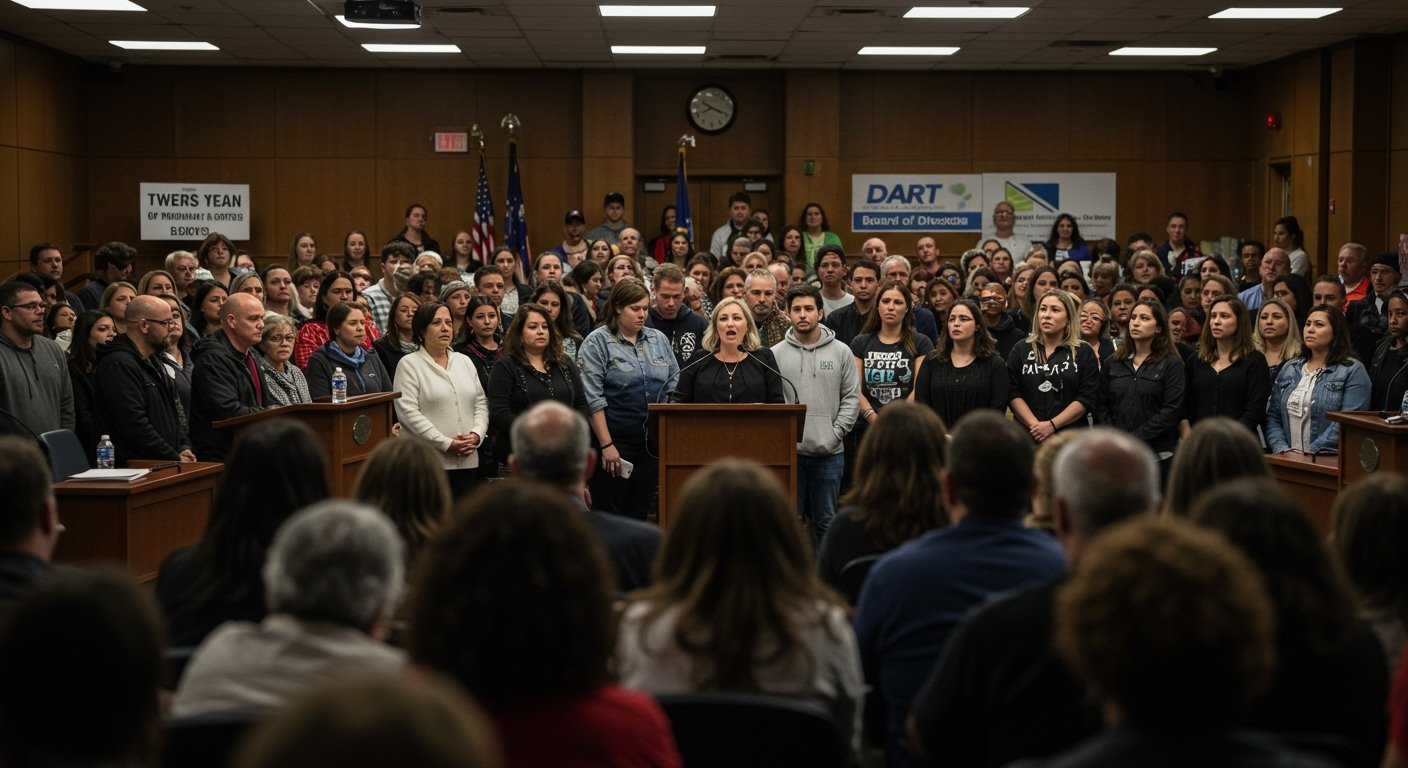DALLAS, TX – The Dallas Area Rapid Transit (DART) agency faced a groundswell of public opposition during a packed public hearing held at its headquarters on Tuesday, July 8, 2025. Residents and community leaders passionately voiced their strong disapproval of proposed sweeping changes to the transit system, which include significant service reductions and fare increases.
Nearly 200 people formally registered to speak before the DART Board of Directors during the lengthy session, with an additional 696 individuals submitting written statements detailing their concerns. The sheer volume of public input underscores the widespread impact and community anxiety surrounding the proposed modifications.
Understanding the Proposed Changes
The catalyst for these proposed service adjustments is largely a new initiative known as the General Mobility Program (GMP). Approved by the DART Board in March 2025, the GMP mandates the redistribution of 5% of DART’s annual sales tax revenue to seven of its member cities. This revenue share is estimated to total approximately $42.59 million in Fiscal Year 2026 alone, representing a substantial reallocation of the agency’s operational funding.
To accommodate this mandated revenue redistribution and address various new service requests from member cities, DART has put forward a comprehensive plan involving service level adjustments and fare revisions. The most prominent proposed changes include the outright elimination of nine bus routes across the cities of Dallas, Plano, Addison, and Irving. Furthermore, some existing GoLink zones – DART’s on-demand paratransit and microtransit service – are also slated for elimination.
Beyond route cuts, the plan proposes significant reductions in service frequency. Most bus routes and light rail lines would see decreased frequency during peak hours, potentially increasing travel times and crowding for daily commuters. Commuter rail services, specifically the existing Trinity Railway Express and the forthcoming Silver Line, would also face reduced service levels, with proposed frequency set to a standardized 60 minutes at all times.
A particularly contentious aspect of the proposal involves significant changes to the ADA Paratransit service. DART is proposing to raise fares for ADA Paratransit riders from the current $3.50 to $6, an increase of over 71%. Additionally, the agency seeks to limit the coverage area for this essential service, raising fears about the impact on some of the community’s most vulnerable residents.
Vocal Opposition and Community Concerns
The public hearing served as a crucial platform for residents to express their anxieties and criticisms directly to the DART Board. Speaker after speaker highlighted the potential adverse consequences of the proposed changes, emphasizing the disproportionate impact on low-income individuals, transit-dependent populations, and residents in areas with fewer transportation alternatives.
Community leaders were also prominent voices in the opposition. Former Dallas City Councilmember Diane Ragsdale spoke emphatically against the proposals, raising concerns about equitable access and the potential for the changes to exacerbate existing transportation disparities. Current Dallas City Councilmember Lorie Blair echoed these sentiments, specifically highlighting the potential negative effects on underserved areas, particularly within Southern Dallas, where many residents rely heavily on DART services for commuting to work, accessing healthcare, and conducting daily errands.
The passionate testimony from nearly 200 speakers and the detailed feedback provided in 696 written statements presented a unified front of community resistance, urging the DART Board to reconsider the proposed cuts and fare increases.
DART’s Response and Next Steps
Responding to the significant public input, Jeamy Molina, DART Executive Vice President and Chief Communications Officer, stated that the agency is committed to the public comment process. Molina emphasized that DART leadership is listening intently to community input gathered during the hearing and through written submissions. She indicated that the agency intends to carefully review all feedback before final decisions are made.
The DART Board of Directors is scheduled to make final determinations regarding the proposed service adjustments and fare changes in August 2025. If approved, the changes are tentatively scheduled to take effect in January 2026. The coming weeks will be critical as DART processes the considerable public feedback received, weighing community needs against the financial and operational pressures driven by the new General Mobility Program and other service considerations.






